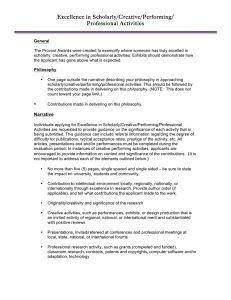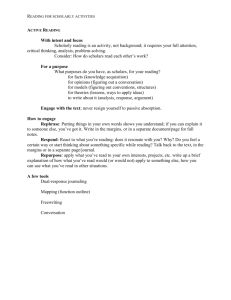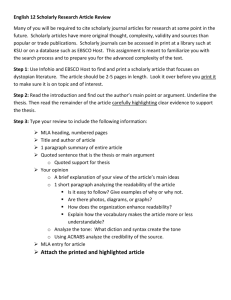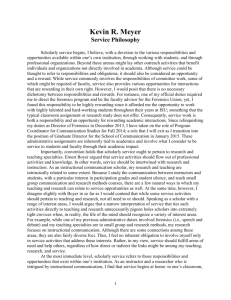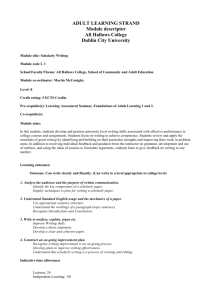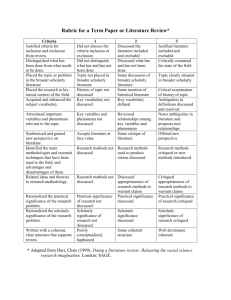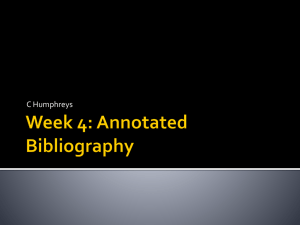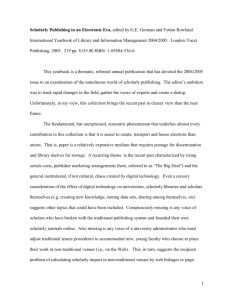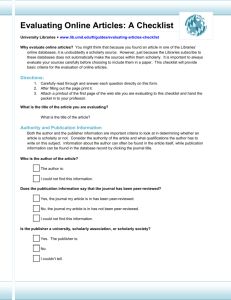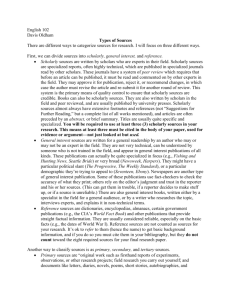Paper Four
advertisement
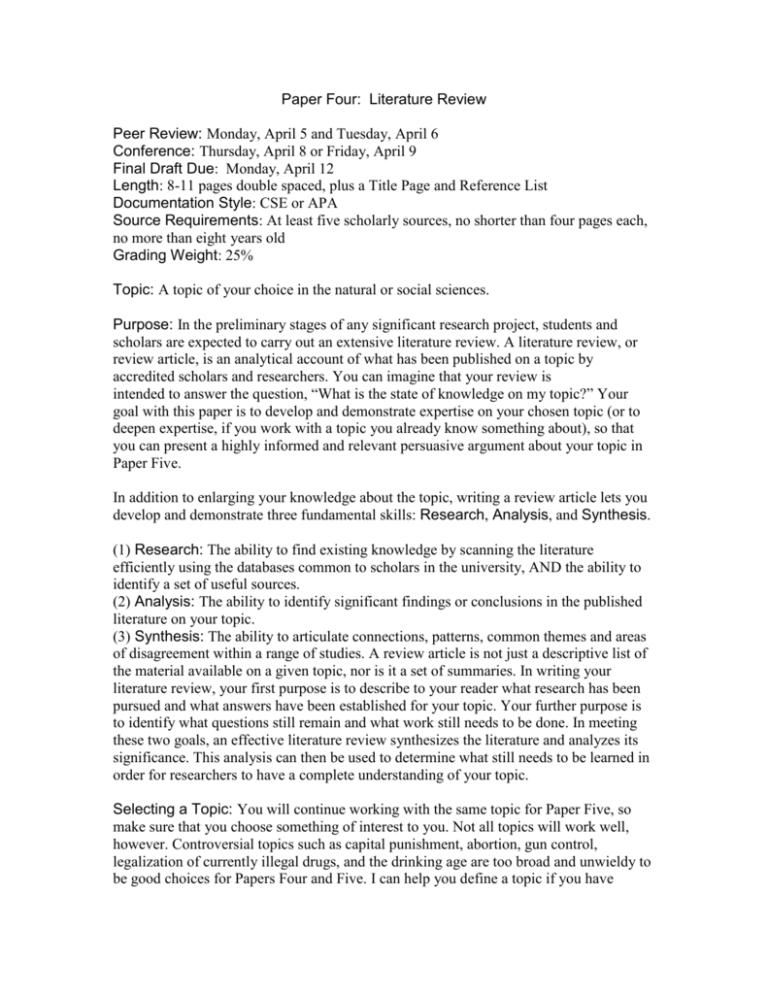
Paper Four: Literature Review Peer Review: Monday, April 5 and Tuesday, April 6 Conference: Thursday, April 8 or Friday, April 9 Final Draft Due: Monday, April 12 Length: 8-11 pages double spaced, plus a Title Page and Reference List Documentation Style: CSE or APA Source Requirements: At least five scholarly sources, no shorter than four pages each, no more than eight years old Grading Weight: 25% Topic: A topic of your choice in the natural or social sciences. Purpose: In the preliminary stages of any significant research project, students and scholars are expected to carry out an extensive literature review. A literature review, or review article, is an analytical account of what has been published on a topic by accredited scholars and researchers. You can imagine that your review is intended to answer the question, “What is the state of knowledge on my topic?” Your goal with this paper is to develop and demonstrate expertise on your chosen topic (or to deepen expertise, if you work with a topic you already know something about), so that you can present a highly informed and relevant persuasive argument about your topic in Paper Five. In addition to enlarging your knowledge about the topic, writing a review article lets you develop and demonstrate three fundamental skills: Research, Analysis, and Synthesis. (1) Research: The ability to find existing knowledge by scanning the literature efficiently using the databases common to scholars in the university, AND the ability to identify a set of useful sources. (2) Analysis: The ability to identify significant findings or conclusions in the published literature on your topic. (3) Synthesis: The ability to articulate connections, patterns, common themes and areas of disagreement within a range of studies. A review article is not just a descriptive list of the material available on a given topic, nor is it a set of summaries. In writing your literature review, your first purpose is to describe to your reader what research has been pursued and what answers have been established for your topic. Your further purpose is to identify what questions still remain and what work still needs to be done. In meeting these two goals, an effective literature review synthesizes the literature and analyzes its significance. This analysis can then be used to determine what still needs to be learned in order for researchers to have a complete understanding of your topic. Selecting a Topic: You will continue working with the same topic for Paper Five, so make sure that you choose something of interest to you. Not all topics will work well, however. Controversial topics such as capital punishment, abortion, gun control, legalization of currently illegal drugs, and the drinking age are too broad and unwieldy to be good choices for Papers Four and Five. I can help you define a topic if you have trouble coming up with good options. If a topic of interest does not automatically come to mind, try skimming recent issues of scholarly journals related to your major or area of interest. You can also search popular journals and newspapers for potential topics, but keep in mind that current events (less than six months old) will not have many, if any, scholarly sources published on them yet. Audience: Your review should be written for an academic audience (students and professors) interested in seeing the broad trends in research on your topic. Scope and Organization: Careful research, analysis and synthesis will help you construct a review article that does the following: -Identifies overall trends in what has been published about your topic. -Combines results into an explanation of what is and is not known about your topic. -Identifies areas of controversy in the literature on your topic. -Formulates questions that need further research by identifying a single problem or new perspective that emerges from your review. In order to effectively accomplish these goals, consider the following strategies for organizing and developing your review: Introduction: In the introduction, you should provide any necessary context for your literature review. You can do this by answering the following questions, or by considering questions of your own: What is the specific research focus that guides your project? What general topics, issues or areas of concern motivated your research? What is the purpose of your literature review? Thesis: Your thesis should define the overall trends you found in the research that has been published on your topic. It should pay particular attention to any significant conflicts, agreements, ambiguities or gaps in the conclusions that your sources make. Body: The body of your literature review should be made up of a discussion of the trends you found in the research on your topic. To keep the body of your paper organized, group sources (such as research studies, theoretical articles, case studies, essays, etc.) according to common denominators such as strategies or approach, conclusions of authors, specific purpose or objective, etc. As you discuss your sources, summarize individual articles with as much or as little detail as each merits according to its comparative importance in the literature. You will need to determine if some of your sources seem to be more important or more influential than others. Remember, the amount of space (length) that you devote to each source denotes its relative significance. Make sure that you assess the body of research as a whole, providing a detailed analysis of trends, points of concurrence and disagreement, and a careful explanation of the overall significance of your findings. Each paragraph in the body of your paper should make a specific point about the state of research on your topic. Conclusion: In your conclusion, review what the research is lacking: Where are there gaps in the research on your topic? What still needs to be studied, understood, argued? What don’t we know? What questions remain? Why? Explain why any further research is necessary (What do we stand to gain from filling that gap?) and how such research might better help us understand the issue at hand. Evaluative Criteria: You will be evaluated based on the level to which you fulfill the requirements of this assignment as stated on the assignment sheet. In addition, pay special attention to: identifying and analyzing relationships among the scholarly articles you review and maintaining an objective stance (make sure that you do not evaluate how good or bad your sources are, but instead focus on how similar or different they may be). Selecting Articles: The articles you select for your review need to be academically reputable. We will discuss criteria for evaluating sources in class, and you should use these criteria to select each of your sources for this paper. In order to be reasonably comprehensive but still manageable, your review should draw on no fewer than five sources, and no more than eight sources. In addition, your sources should be fairly substantive and current; thus you should not include among your sources any articles shorter than four pages or more than eight years old. You are likely to find 10, 20, or even 30 sources published in the last eight years and you’ ll need to select from among them. Your selection should be based on your evaluation of which sources best represent the aspects of the research you wish to highlight. There may, for example, be three studies that all produce similar results; look for the one that is most comprehensive or current, or that best exemplifies this kind of research for your purposes. Because the literature review is limited to academic sources, web sites are not valid sources for this assignment. Instead, you will have to rely on the databases available through the NCSU Libraries website. While the full text of many appropriately academic articles is available online, some articles are only available in hard copy. For these articles, you will have to find the hard copy at the library or use Tripsaver for sources that are not available at D. H. Hill. If you have difficulty finding scholarly sources, you can meet with me during my office hours or consult a reference librarian for help. If you meet with a reference librarian, make sure you take this assignment sheet with you!
